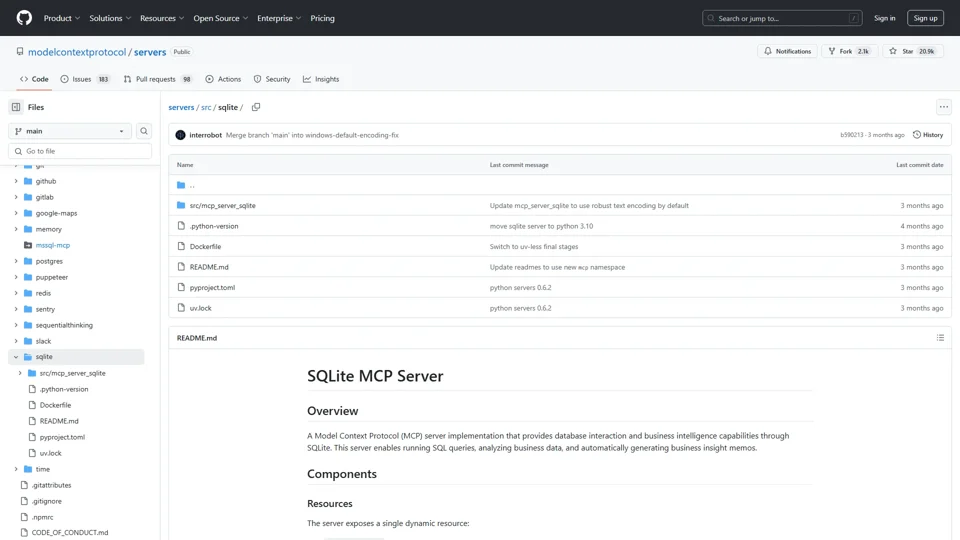What is the SQLite MCP Server?
The SQLite MCP Server is a specialized component of the Model Context Protocol (MCP) that enables AI-powered database interactions and automated business intelligence. This server implementation allows developers to:
- Execute SQL queries through AI agents
- Automatically generate business insights from data patterns
- Create dynamic data analysis workflows
- Integrate database operations with AI applications like Claude Desktop
Key Features
AI-Database Integration
- Query Execution Tools:
read_queryfor SELECT operationswrite_queryfor INSERT/UPDATE/DELETEcreate_tablefor schema management
- Automatic Insight Generation:
- Continuous updates to memo://insights resource
- Append_insight tool for AI-driven analysis
- Schema Intelligence:
- Table listing and description capabilities
- Dynamic schema understanding for query optimization
Developer Support
- Pre-built Docker containers for rapid deployment
- Python 3.10 compatibility with uv dependency management
- MIT-licensed open source implementation
How to Implement
AI Development Integration
# Claude Desktop Configuration
"mcpServers": {
"sqlite": {
"command": "uv",
"args": [
"run",
"mcp-server-sqlite",
"--db-path", "/data/ai_analytics.db"
],
"env": {
"PYTHONIOENCODING": "utf-8"
}
}
}
Production Deployment
docker build -t ai-sqlite-server . --build-arg UV_REQUIREMENTS=uv.lock
Pricing Structure
-
Free Tier: Full access to server codebase under MIT License
-
Enterprise Support: Available through Model Context Protocol partnerships
-
Cloud Hosting: BYO infrastructure with Kubernetes-ready configuration
Helpful Development Tips
-
AI Training Data Setup
- Use
create_tablewith synthetic data generators - Implement automated schema migrations
- Use
-
Insight Automation
- Chain
read_querywith append_insight in workflows - Implement cron jobs for periodic analysis
- Chain
-
Performance Optimization
- Use connection pooling for high-frequency AI queries
- Implement query caching layers
-
Security Practices
- Containerize with read-only filesystems
- Implement SQL injection filters in write_query
Frequently Asked Questions
Q: How does this handle large AI datasets?
A: Uses SQLite's RBU extension for bulk operations and WAL mode for concurrent access
Q: Can multiple AI agents share a database?
A: Yes through write-ahead logging (WAL) mode with proper transaction handling
Q: What's the insight generation frequency?
A: Real-time updates through append_insight tool triggers
Q: How to scale beyond SQLite limitations?
A: The architecture supports PostgreSQL adapter replacement
Q: Data security for AI training?
A: Includes optional encryption extensions and audit logging
Q: Integration with vector databases?
A: Through separate MCP server components in the ecosystem
This implementation helps AI developers overcome:
-
Data Management Complexity: Unified interface for structured data operations
-
Insight Generation Automation: Built-in memo system for continuous analysis
-
AI/Database Integration: Pre-built tools for training data management
-
Scalability Challenges: Modular architecture supporting multiple database backends
